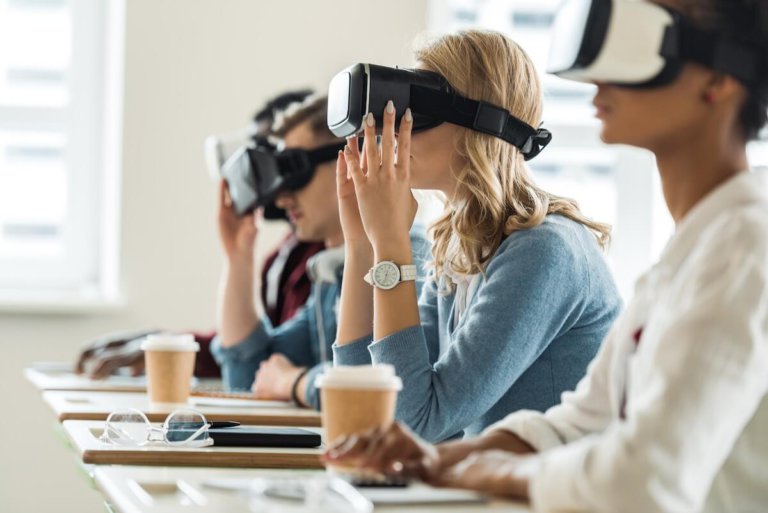
Technology continues to play an increasingly important role in both our personal and professional lives, especially as we dive deeper into the Fourth Industrial revolution.
Just about every industry is immersing itself in technology – including the education sector. Today’s students – or digital natives – have been raised in an environment where the internet and technology has been tightly woven into the fabric of their lives. Despite this, not all education institutions have evolved with the times to embrace digital learning practices that can help facilitate students’ learning.
Teaching tomorrow’s workforce in the digital era can be made more fruitful by tapping into the rise of new technologies, which present universities with a wealth of opportunities to facilitate students’ learning. New technologies encompass different breeds of technology such as virtual reality (VR), augmented reality (AR), gamification, mobile learning applications and online learning platforms, among others.
As universities play a crucial role in moulding tomorrow’s talents, the application of technology can help universities stay ahead of the curve by not only supporting educators’ teaching and promoting creative enquiry, but also enhancing learning through exposure to advanced technology, making learning more satisfying and engaging than cases of passive classroom learning.
Tapping into the wonders of AR & VR
Students looking to enrol in a university that taps into the power of new technologies may want to consider Concordia University. This Canadian public university is nestled in Montréal, Québec’s largest city.
Concordia is making great use of this technology by working in close collaboration with Knowledge One – a learning and eLearning consulting services company – to help with its eLearning, blended learning and mobile learning solutions. For instance, the overarching goal of its Augmented Reality (AR), Virtual Reality (VR), Simulation Project is to develop and disseminate the know-how, infrastructural, economic and adoption models that underpin experiential learning and industrial-level development, contributing to national and international innovation as it applies to teaching and learning in higher education (HE) sectors.
As such, for the past few years, KnowledgeOne have been releasing multiple courses using a gamified learning experience, as well as social and interactive tools that boost students’ level of engagement and motivation. “Today, KnowledgeOne is also actively investigating new ways to integrate Augmented, Mixed and Virtual Reality to future projects as well as partnering with various industries specialised in the development of immersive technologies,” says Robert Beauchemin, CEO of KnowledgeOne.
 Advances in AR, VR and simulation have opened the floodgates to digital internships, virtual labs, simulated industrial operations and novel approaches to collaborative and experiential learning. For example, while unorthodox, digital internships serve as a useful platform for students who are unable to engage in a ‘real-time’ internship due to personal constraints, such as family commitments. VR has been dubbed a revolutionary tool that provides students with an immersive learning experience, transporting them to a new environment without ever leaving the classroom.
Advances in AR, VR and simulation have opened the floodgates to digital internships, virtual labs, simulated industrial operations and novel approaches to collaborative and experiential learning. For example, while unorthodox, digital internships serve as a useful platform for students who are unable to engage in a ‘real-time’ internship due to personal constraints, such as family commitments. VR has been dubbed a revolutionary tool that provides students with an immersive learning experience, transporting them to a new environment without ever leaving the classroom.
At Concordia University, such options present students with the opportunity to learn in mixed reality and simulation environments, helping them visualise difficult concepts, explore environments that are dangerous or challenging to access and augment a student’s ability to gain knowledge, practice skills and experience. The combination of these realities with artificial intelligence (AI) and other machine learning technologies allows for very unique and innovative ways of teaching and learning.
Strong partnerships & 21st century learning experiences
While innovative technologies present new ways to enhance learning, strong university-industry partnerships benefit the university, the industry and of course, the student. These partnerships expose students to real-world issues and problems.
In a similar vein, Concordia’s partnership with KnowledgeOne also sees them identifying ways to ensure students reap the benefits of these digital learning experiences by understanding ways to enhance students’ self-regulated learning, self-motivation, study skills and technological self-efficacy.
A 2019 EDUCAUSE Horizon Report notes that demand for “digitally rich learning environments and pedagogically sound learning experiences” is expected to increase, adding that institutions that have invested in learning designers and instructional designers will be better positioned to create rigorous, high-quality programming that serves the needs of all learners.
It also notes that students have a preference for blended learning – or a combination of digital learning platforms, personalised or adaptive courseware and web conferencing tools – citing flexibility, ease of access and the integration of sophisticated multimedia.
For students who are excited to embrace digital learning experiences at university, Concordia University may be the best place to start.
Follow Concordia University on Facebook, Twitter, Instagram and YouTube
Liked this? Then you’ll love…
Does Virtual Reality technology help university students learn?
How virtual reality technologies are revolutionising STEM learning







